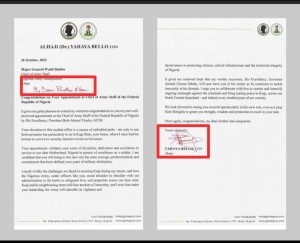YAHAYA BELLO’S RED PEN POWER HANGOVER AND WHAT IT MEANS FOR THOSE WHO REFUSE TO FACE REALITY OF THE TRANSIENT OF POWER
Yahaya Bello’s Red-Pen Power Hangover
— Yusuf, M.A
Yahaya Bello’s now-deleted letter to the new Chief of Army Staff, Major General W. Shaibu, isn’t just a congratulatory note gone wrong. It is a Freudian confession, a political X-ray of a man who has vacated office but not power.
Here’s a former governor who, despite having no shred of constitutional authority left, still wrote to a serving service chief on Kogi State Government letterhead, decorated with the Nigerian coat of arms, and personally signed it in red ink, the bureaucratic color of command. In diplomatic and military correspondence, red ink signifies authority, correction, or reprimand. In other words, Bello’s pen screamed what his heart still believes: “I am still the governor!”
But what truly gives away the pathology of this letter is its language. Rather than simply congratulating Major General W. Shaibu on his appointment, Bello issued what can only be described as a coded directive. He reminded the General of “the challenges we faced during my tenure” and then proceeded to express confidence that “my worthy successor will have you in his corner”, as though the Chief of Army Staff were some loyal subordinate he was handing over to his apprentice.
He didn’t stop there. Bello urged the Army Chief to “collaborate with my worthy successor,” as if the Nigerian Army takes operational instructions from former governors. That’s not statesmanship; that’s delusion dressed in official letterhead.
Only a sitting governor can communicate officially with a service chief. For a former governor to do so, using state emblems and the coat of arms, is a symbolic impersonation of office, and in legal terms, borders on misrepresentation of authority. But more than a legal violation, it’s a psychological one, the inability to accept that the sun has set on his reign.
Bello’s letter wasn’t written to congratulate; it was written to command. It wasn’t meant to honor Major General Shaibu; it was meant to remind him who used to give orders. His signature wasn’t just ink on paper, it was the lingering fingerprint of political addiction.
And what’s worse? His aides, instead of counseling restraint, joined in the applause. His media former aide, Barrister Onogwu Muhammed, a man who should know better, proudly shared the letter on Facebook without realizing that he was publicizing an embarrassment, not an achievement.
But this is the tragedy of our political culture: advisers have become echo chambers, and sycophancy has replaced sound judgment. The people who should whisper truth into their principal’s ears now compete to massage their egos, even when they’re careening into disgrace.
Yahaya Bello’s letter has since been deleted, but deletion doesn’t erase folly. It only confirms guilt. The red pen may be gone, the post may be down, but the arrogance it revealed is permanently inked into the record.
In the end, the episode is not about one man’s mistake, it’s about the dangerous intoxication of power in a political class that doesn’t know when to step down from the stage. Bello’s letter was never a congratulatory message; it was a cry for relevance from a man who can’t accept that the play is over.




Comments are closed.